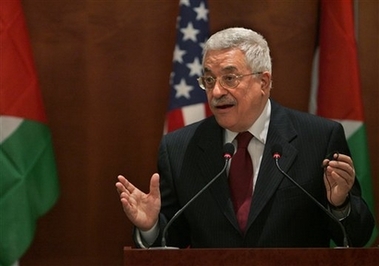Abbas: Talks with Hamas hit 'dead end'
(China Daily/Agencies)Updated: 2006-12-01 07:19
Palestinian President Mahmoud Abbas yesterday said talks to achieve a national unity government aimed at ending an international aid boycott have reached a "dead end."
Meeting with Abbas as her boss, US President George W. Bush, was in neighbouring Jordan to discus the Middle East's other simmering conflict with Iraqi Prime Minister Nouri al-Maliki, Rice also said the humanitarian situation in the Palestinian territories, including what she called "humiliations," must be eased.
In a gesture of support for Palestinian aspirations, Rice said any future Palestinian state should be "viable" and "contiguous" and said no actions should be taken now to prejudge the outcome of a final peace deal.
Her words were an apparent reference to Israeli settlement activity in the West Bank.
Abbas said he lamented the difficulties surrounding efforts to form a joint government between the Palestinians' current Hamas rulers and Abbas's own moderate Fatah Party. Such a government is seen as vital to lifting an international aid boycott imposed on the Palestinian Authority and making progress towards peace.
"We have discussed our efforts to form a national unity government. We have exerted efforts we have worked in many directions but unfortunately we have hit a dead end," said Abbas.
Despite the setback on a unity government the meeting threw notable US weight behind a cease-fire between Israel and the Palestinians announced last weekend and bolsters the hope of renewed peace talks.
The truce ended a five-month Israeli military offensive in the Gaza Strip and the firing of rockets by Palestinian militants into Israel.
A senior US State Department official, who spoke on condition of anonymity because he was not authorized to discuss the matter, said the US would like to see the cease-fire extend beyond Gaza to the West Bank.
He said Rice's meeting with Abbas, and a later discussion with Israeli Prime Minister Ehud Olmert in Jerusalem, were intended to press the two sides on their commitment to peace.
Rice to probe possible new gov't
Rice was also expected to try to determine how close the Palestinians were to forming a more moderate government to replace the current one led by Islamic Hamas militants, who took control after January parliamentary elections.
Abbas, leader of the rival Fatah party, is leading efforts to assemble a government acceptable to the West and Israel.
Rice's senior adviser on Iraq, David Satterfield, said the Palestinians have to form a unity government that can deal with Israel and recognize its right to exist.
He added that the Bush administration hoped Abbas would form a government without Hamas.
The government Abbas has been working to form was to consist of independent administrators who have ties to Hamas or Abbas' Fatah movement, but are not leading members.
Efforts to form the government have been hampered by Hamas' insistence that it control both the key Interior and Finance ministries, which Abbas says must be filled by independents.
Rice's trip to Jericho and Jerusalem came as Arab states have put pressure on Washington to make progress on what they say is the Middle East's priority settling the Israeli-Palestinian conflict.
Peace efforts have been frozen for six years, since the latest Palestinian uprising erupted. The "road map" peace plan, presented by Bush in 2003, faltered when neither side carried out its initial obligations.
Olmert reached out to the Palestinians on Monday, saying he was prepared to grant them a state, release desperately needed funds and free prisoners if they choose the path of peace.
The chief Palestinian negotiator said he believed the cease-fire and Olmert's conciliatory speech earlier this week have created new momentum. "I think it's up to us and the Israelis to make it work," said the negotiator, Saeb Erekat.
| 1 | 2 |  |
|
||
|
||
|
|

